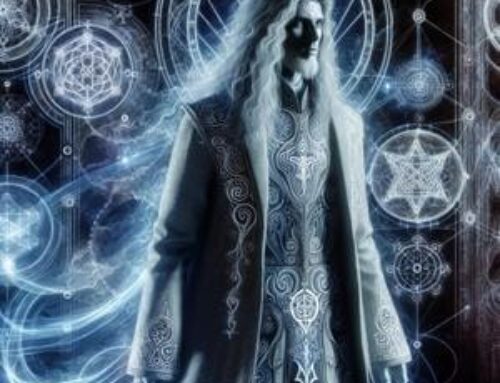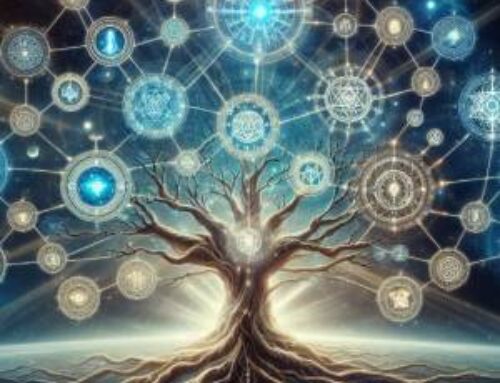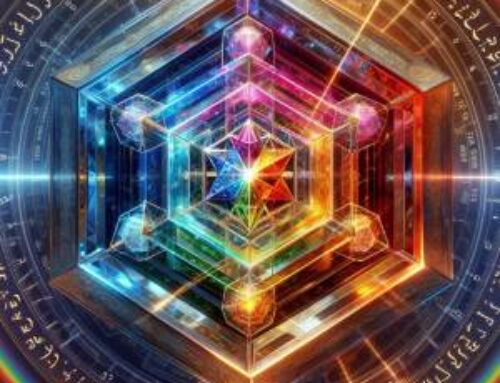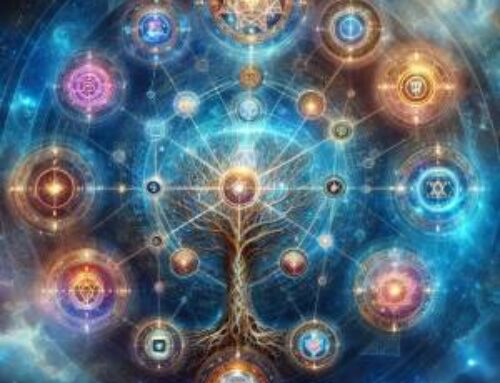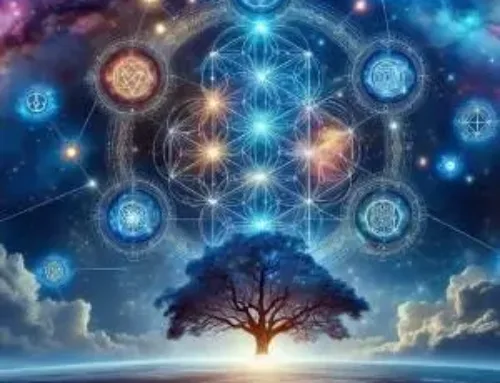Contents
- 1 Introduction to Greek Kabbalah
- 2 The Foundations of Greek Kabbalah
- 3 Mystical Interpretations Across Cultures
- 4 The Universal Language of Numbers
- 5 The Esoteric and the Exoteric
- 6 Practical Wisdom for the Modern Seeker
- 7 Conclusion
- 8 FAQ – Greek Kabbalah
- 8.1 1. What is Greek Kabbalah?
- 8.2 2. How does Greek Kabbalah differ from traditional Kabbalah?
- 8.3 3. Can Greek Kabbalah provide practical wisdom for today’s challenges?
- 8.4 4. How can I start learning about Greek Kabbalah?
- 8.5 5. What role does numerology play in Greek Kabbalah?
- 8.6 6. How can Greek Kabbalah enhance my spiritual journey?
- 9 References:
Introduction to Greek Kabbalah
In an age where the search for meaning deepens amidst our modern complexities, the mystical teachings of Greek Kabbalah offer a beacon of wisdom that illuminates the path to self-discovery and universal understanding. This ancient yet timeless wisdom, rooted in the heart of Kabbalistic mysticism, finds its reflection in the profound philosophical inquiries of ancient Greece. This article embarks on an explorative journey to uncover the synergies between these two rich traditions, shedding light on their shared quest for the esoteric truths that lie beneath the surface of the exoteric world.
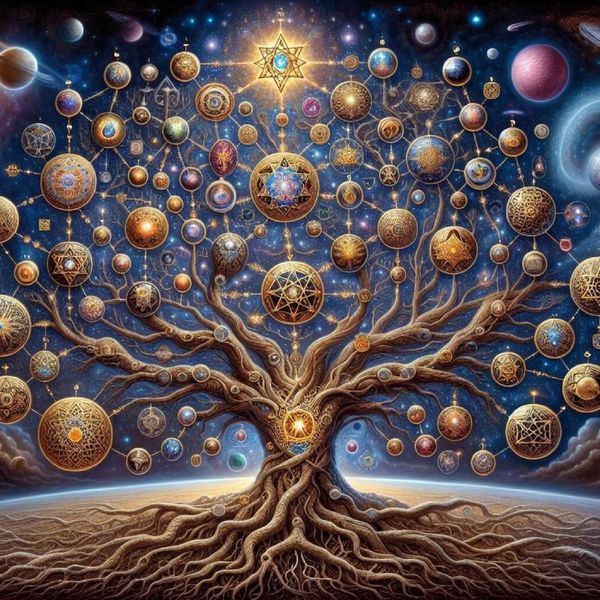
As we traverse the historical landscapes that have cradled these teachings, we uncover the mystical interpretations that transcend cultural and temporal boundaries, revealing a unified pursuit of knowledge and enlightenment. Through the universal language of numbers and the delicate balance between the hidden and the revealed, Greek Kabbalah emerges as a guiding force, offering insights that resonate with the spiritual seekers of today.
This article invites you on a journey of enlightenment, where the ancient wisdom of Greek Kabbalah and the timeless philosophies of Greece converge to guide us towards a deeper understanding of our existence and the cosmos that envelops us. Join us as we unveil the mystical synergy between these two worlds, exploring their teachings and practical wisdom for the modern seeker, and discovering the pathways they light towards personal and universal truths.
It is by the Kabbalah and this alone that all is explained and reconciled. All other doctrines are vivified and made fruitful thereby; it destroys nothing but on the contrary gives reason to all that is (1).
The Foundations of Greek Kabbalah
Greek Kabbalah, a term that evokes the mystique of ancient wisdom, represents a unique fusion of Kabbalistic mysticism with the philosophical depth of Greek thought. Unlike the traditional Kabbalah, which traces its roots back to Judaic mysticism, Greek Kabbalah emerges from a confluence of cultures, where the mystical teachings of the Kabbalah intersect with the philosophical inquiries of ancient Greece. This blending of traditions offers a distinct pathway to spiritual enlightenment, one that harmonizes the intricate structures of Kabbalistic thought with the rational and aesthetic virtues of Greek philosophy.
Philosophical Underpinnings
At the core of Greek Kabbalah lies the pursuit of knowledge and understanding through an exploration of the divine and the cosmos. Similar to its Judaic counterpart, it seeks to unravel the mysteries of existence, yet it does so through a lens polished by Greek philosophical thought. The teachings of Plato, Aristotle, and Pythagoras, with their emphasis on form, substance, and numerology, find a resonant echo in the symbolic and numerical analyses of Kabbalistic texts. This philosophical underpinning enriches the Kabbalistic quest for divine wisdom, introducing elements of Greek metaphysics and ethics into the mystical journey.
A Bridge Between Cultures
The emergence of Greek Kabbalah signifies a remarkable cultural synthesis, where the esoteric knowledge of the East meets the philosophical legacy of the West. This cross-cultural exchange not only broadens the scope of Kabbalistic teachings but also elevates Greek philosophy to a transcendent dimension, where logos and mythos converge. Through Greek Kabbalah, mystics and philosophers alike can traverse a shared spiritual landscape, one that transcends the boundaries of tradition and dogma.
Legacy and Influence
The legacy of Greek Kabbalah extends far beyond its historical origins, influencing contemporary spiritual and philosophical thought. Its teachings, steeped in the wisdom of two of the world’s most profound mystical and philosophical traditions, offer a compass for navigating the complexities of modern life. In a world yearning for meaning and connection, Greek Kabbalah provides a timeless wisdom that speaks to the soul’s deepest inquiries, offering insights into the nature of reality, the pursuit of virtue, and the path to enlightenment.
Enlightenment is the ability to use one’s own understanding without another’s guidance, resulting in man’s emergence from self-imposed nonage (2).
Mystical Interpretations Across Cultures
The mystical paths of Greek philosophy and Kabbalistic teachings converge in their sacred quest for divine wisdom. Both traditions seek to uncover the deeper meanings hidden within sacred texts, employing allegory, symbolism, and numerical analysis as tools for revelation. This shared pursuit not only illuminates the intrinsic connections between these wisdom traditions but also underscores the universality of the mystical experience across different cultures.
Archetypes can be understood as culturally determined symbolic forms, organizing and structuring non-cognitive mental aspects of human life, rather than biologically inherited predispositions (3).
Allegory and Symbolism
Greek Kabbalah stands as a testament to the power of allegory and symbolism in bridging the realms of the seen and the unseen. The parables of the New Testament, enriched by the Hellenistic context of their composition, resonate with the allegorical interpretations found in Kabbalistic literature. These narratives, layered with metaphysical significance, invite the seeker into a contemplative journey towards understanding the mysteries of existence and the divine.
The Role of Numerology
Numerology plays a pivotal role in both Greek and Kabbalistic mysticism, serving as a key to unlocking the esoteric meanings of sacred texts. The Pythagorean emphasis on numbers as the essence of the cosmos finds a parallel in the Kabbalistic use of Gematria, where letters and words are interpreted based on their numerical value. This numerological approach reveals a shared knowledge of in the cosmic significance of numbers as a language through which the divine communicates its mysteries to humanity.
Cross-Cultural Exchange and Influence
The exchange of mystical knowledge between Greek and Kabbalistic traditions has enriched both, fostering a cross-cultural dialogue that transcends the boundaries of language and geography. Greek Kabbalah embodies this synthesis, offering a holistic approach to spiritual wisdom that integrates the analytical rigor of Greek philosophy with the mystical depth of Kabbalistic thought. Through this intercultural lens, seekers are invited to explore a more comprehensive understanding of the divine and the cosmos.
Universal Themes of Mysticism
The exploration of mystical interpretations across cultures reveals universal themes that resonate with the human quest for meaning. The journey towards enlightenment, the understanding of one’s true nature, and the aspiration to unite with the divine are threads that weave through the tapestry of Greek and Kabbalistic mysticism. Greek Kabbalah, in highlighting these universal themes, serves as a bridge between worlds, inviting us to recognize the shared spiritual heritage of humanity.
The Universal Language of Numbers
In the mystical landscape of Greek Kabbalah, numbers are revered as the foundational elements of the cosmos, echoing the ancient Greek philosopher Pythagoras’s assertion that numbers constitute the true nature of the universe. This reverence for numbers is reflected in Kabbalistic teachings, where the numerical values of Hebrew letters and words have deep spiritual significance, offering insights into the divine blueprint of creation.
The Kabbalistic Art of Numerology
At the heart of Kabbalistic mysticism lies Gematria, a form of Jewish numerology that assigns numerical value to words and letters, revealing hidden connections and deeper meanings within the sacred texts. This method of interpretation uncovers layers of wisdom encoded within the Hebrew Bible, demonstrating how numerical relationships can illuminate the interconnectedness of divine, cosmic, and human realms.
Pythagorean Harmony and Kabbalistic Spheres
The Pythagorean concept of numerical harmony finds its spiritual counterpart in the Kabbalistic Tree of Life, where the ten sephirot (divine emanations) map the journey of divine energy from the ineffable source to the material world. Just as Pythagoras viewed numbers as the principles governing harmony and proportion in the universe, Kabbalistic numerology views the sephirot as the numerical framework through which the divine order manifests in creation.
Numerology as a Path to Enlightenment
For seekers of wisdom within the tradition of Greek Kabbalah, numerology offers a path to enlightenment, a means of transcending the material to touch the essence of the divine. Through the study of numerical correspondences, mystics and philosophers alike can uncover the sacred patterns that underlie the visible world, gaining insights into the nature of reality and the soul’s journey towards unity with the divine.
Bridging Worlds Through Numbers
The universal language of numbers bridges the worlds of Greek philosophy and Kabbalistic mysticism, serving as a testament to the timeless quest for knowledge and understanding. In the realm of Greek Kabbalah, numbers are not merely mathematical constructs but symbols of the deeper truths that bind the universe together, offering a key to unlocking the mysteries of existence.
The Esoteric and the Exoteric
In the tradition of Greek Kabbalah, the esoteric and exoteric are not seen as opposites but as complementary aspects of a unified spiritual reality. The esoteric aspects represent the inner, hidden dimensions of mysticism, accessible through deep contemplation and inner work. In contrast, the exoteric aspects relate to the outward, accessible teachings and practices that guide the seeker on the path of enlightenment. This dual approach reflects the holistic nature of Greek Kabbalah, which embraces the full spectrum of spiritual wisdom.
The Role of the Mystical and the Practical
Greek Kabbalah emphasizes the importance of balancing mystical insights with practical application. The mystical, esoteric teachings delve into the profound mysteries of existence, offering a deeper understanding of the cosmos and the divine. Meanwhile, the practical, exoteric teachings provide a framework for living a life aligned with these higher truths, embodying virtues such as wisdom, compassion, and integrity. This balance ensures that spiritual knowledge is not just an abstract concept but a living, breathing aspect of daily existence.
Initiation into the Mysteries
The journey from exoteric to esoteric knowledge in Greek Kabbalah is an initiatory process, a process of gradual unveiling that brings the seeker closer to the Divine. This path of initiation requires the guidance of an initiator who connects the seeker to the higher levels of meaning and understanding that comprise the mystical path.
Practical Wisdom for the Modern Seeker
In a world that often values the material over the spiritual, the teachings of Greek Kabbalah emerge as a beacon of light, offering timeless wisdom that transcends the ages. This mystical tradition, with its roots deeply embedded in the confluence of Greek philosophy and Kabbalistic mysticism, provides a wellspring of knowledge that can address the existential dilemmas of the modern era. It encourages seekers to look beyond the surface, to find harmony and purpose in a rapidly changing world.
Greek Kabbalah, with its intricate blend of mystical and philosophical teachings, offers profound insights into navigating the complexities of contemporary life. It teaches the art of balance—between action and contemplation, material success and spiritual fulfillment, individuality and universality. This tradition urges seekers to cultivate a deep inner life while actively engaging with the world, promoting a sense of responsibility towards oneself and the greater community.
The Quest for Self-Discovery
At the heart of Greek Kabbalah lies the quest for self-discovery and self-knowledge. This ancient wisdom tradition offers tools for introspection and self-examination, guiding individuals on a journey to uncover their true nature and potential. Through meditation, contemplation, and study, seekers are encouraged to peel away the layers of ego and illusion, revealing the luminous essence within.
Ethical Living and Spiritual Growth
Greek Kabbalah emphasizes the importance of ethical living as the foundation for spiritual growth. It teaches that virtues such as honesty, compassion, and integrity are not merely moral obligations but pathways to divine connection. By embodying these virtues in daily life, individuals can align themselves with the higher principles of the cosmos, fostering a sense of unity and harmony with all creation.
Empowering the Individual
One of the most empowering aspects of Greek Kabbalah is its affirmation of the individual’s ability to connect with the divine and effect meaningful change in the world. This tradition acknowledges the power of human agency, encouraging seekers to use their unique gifts and talents in service to a higher purpose. It offers a vision of empowerment rooted in spiritual awareness, where every action and decision is imbued with deeper significance.
A Bridge to the Divine
The concept of the unwritten Kabbalah, revealed through direct experience rather than written texts, underscores the esoteric nature of Greek Kabbalah. This direct transmission of spiritual wisdom from teacher to student highlights the dynamic, living nature of the tradition, where the deepest truths are often found beyond the realm of words and into the heart of direct experience.
Wisdom for the Modern Seeker
In today’s world, where the external often overshadows the internal, the teachings of Greek Kabbalah offer a reminder of the value of inner work and the pursuit of esoteric knowledge. By fostering a deeper connection with the unseen dimensions of reality, seekers can find a source of guidance and inspiration that enriches their understanding of themselves and the world around them.
Conclusion
As we draw the curtains on our journey through the mystical landscapes of Greek Kabbalah, we find ourselves at a juncture of profound understanding and infinite possibility. The exploration has revealed the rich tapestry of wisdom woven from the threads of ancient Greek philosophy and the mystical depths of Kabbalistic teachings (4). Greek Kabbalah emerges not merely as a tradition but as a living bridge connecting the wisdom of the past with the spiritual seekers of the present.
Greek Kabbalah, with its unique synthesis of Hellenic and Kabbalistic mysticism, offers a luminous path to enlightenment that transcends cultural and temporal boundaries. It invites us to look beyond the material, to question, to seek, and ultimately, to understand the interconnectedness of all things through the divine language of numbers, the balance of the esoteric and exoteric, and the practical application of ancient wisdom in the complexities of modern life.
This exploration into Greek Kabbalah serves as a beacon for those yearning for depth, meaning, and connection in an increasingly fragmented world. It beckons us to embark on a journey of self-discovery, ethical living, and spiritual awakening, guided by the timeless principles of wisdom, compassion, and integrity.
Gateway to Deeper Exploration
For seekers inspired by the profound insights and transformative potential of Greek Kabbalah, the Hermetic Academy stands as a gateway to deeper exploration. The Academy offers a sanctuary for those drawn to the mysteries of the cosmos, providing initiation, guidance, resources, and a community of like-minded individuals passionate about spiritual growth and enlightenment.
FAQ – Greek Kabbalah
1. What is Greek Kabbalah?
Greek Kabbalah is a mystical tradition that marries the profound wisdom of ancient Greek philosophy with the esoteric teachings of Kabbalah. It explores the synergy between these two rich traditions, offering pathways to enlightenment through the universal language of numbers, the balance of hidden and revealed knowledge, and the application of ancient wisdom in modern life.
2. How does Greek Kabbalah differ from traditional Kabbalah?
While jewish Kabbalah is rooted in Judaic mysticism, Greek Kabbalah extends its branches into the realm of Greek philosophy, embracing the rational and aesthetic virtues of Greek thought. This fusion enriches the mystical pursuit of divine wisdom, making Greek Kabbalah a unique pathway that incorporates the philosophical insights of ancient Greece.
3. Can Greek Kabbalah provide practical wisdom for today’s challenges?
Yes, Greek Kabbalah offers timeless wisdom that is profoundly relevant to contemporary life. It teaches the art of balance, ethical living, and self-discovery, empowering individuals to navigate the complexities of the modern world with insight, compassion, and integrity.
4. How can I start learning about Greek Kabbalah?
Engaging with the teachings of the Hermetic Academy, which offers courses and resources on Greek Kabbalah, is an excellent way to start. The Academy provides initiation, guidance and a community for those drawn to the mysteries of the cosmos and the pursuit of spiritual growth.
5. What role does numerology play in Greek Kabbalah?
Numerology is central to Greek Kabbalah, serving as a key to unlocking the esoteric meanings of sacred texts and understanding the cosmic significance of numbers. This shared belief in numbers as a divine language highlights the interconnectedness of Greek philosophy and Kabbalistic mysticism, revealing the cosmic patterns that underlie the visible world.
6. How can Greek Kabbalah enhance my spiritual journey?
Greek Kabbalah can significantly enhance your spiritual journey by offering a holistic approach to understanding the mysteries of existence. It encourages a deep exploration of the self and the universe, fostering a connection with the divine through the synthesis of mystical and philosophical wisdom.
References:
(1) Eliphas, L. (1854). Dogme et Rituel de la Haute Magie. Paris, Frankreich.
(2) Kant, I. (2015). What is Enlightenment. https://doi.org/10.1017/9781787440609.002.
(3) Pietikainen, P. (1998). Archetypes as symbolic forms. Journal of Analytical Psychology, 43, 325-343. https://doi.org/10.1111/1465-5922.00032.
(4) Rubenstein, E. (2020). The Tree of Life: The Kabbalah of Immortality. Hermetic World, Paphos.

